Given the countless website builders on the market, people often find themselves overwhelmed when trying to pick the best one for their business. That explains why the WordPress vs Jimdo debate continues to rage on, even after years of back-and-forth!
But no worries; we're here to clear things up for you once and for all with our detailed comparison. Here's what we'll explore:
- A quick overview of WordPress and Jimdo
- Understanding their 9 key differences
- Which one should you choose?
Ready for it? Keep scrolling!
Understanding WordPress vs Jimdo
Before starting our comparison between WordPress and Jimdo, let’s take a moment to learn what each platform is all about:
About WordPress
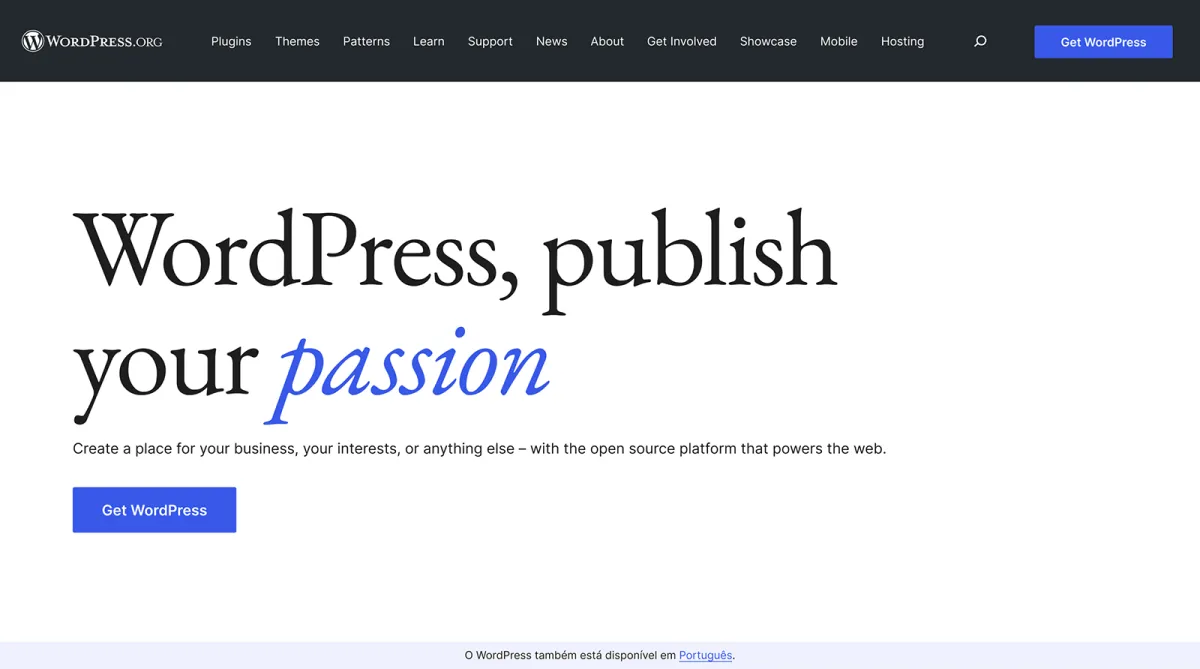
WordPress is celebrated as a powerful content management system (CMS), ideal for those looking to create stunning, highly personalized websites with plenty of customization options. Its flexible and user-friendly features have made it a favorite among bloggers, developers, and small business owners.
As of our writing, there are two versions available: WordPress.org vs WordPress.com. However, at the mention of WordPress, most people would typically think of WordPress.org – the open-source version, which is also our focus in today's article.
About Jimdo

Originally from Germany, Jimdo is a versatile web platform that gives users everything they need to create and manage their own website or online store. It's best suited to small businesses (with very little customization needed) seeking a quick, hassle-free setup without technical issues.
Specifically, Jimdo bundles hosting into its subscription plans, meaning you can totally skip the headaches of server management or hunting for third-party hosting providers. That sets Jimdo quite apart from WordPress.org (open-source with no hosting services ready); you will understand more about their differences in our analysis below.
WordPress vs Jimdo: Break Down The 9 Key Differences
Now that you have gained a solid overview of Jimdo vs WordPress, let’s see which platform is better!
Here’s a little spoiler: WordPress is the ultimate winner in this battle, thanks to its impressive 59,000+ plugins, a vast theme collection of over 12,000, and powerful eCommerce and marketing features. Below, we’ve summarized the key comparison criteria and highlighted the winner in each category for a quick glance:
Features | WordPress | Jimdo | Overall Winner |
Pricing | Free software, but additional costs for hosting ($2 to $100/month) and domain ($10 to $20/year) | Eight pricing plans ranging from $0 to $45/month, with clear benefits for websites and eCommerce | Tie |
Hosting | Requires researching and managing your own hosting provider | Hosting included with all plans, with free domains for the first year | Jimdo |
Ease of use | Intuitive block editor with drag-and-drop functionality, custom CSS option | AI-assisted setup, no coding required option, and customization for coding experts | Tie |
Site templates | 12,000+ themes with extensive filtering options | 21 themes with 5-6 variations, limited filtering options | WordPress |
Apps and plugins | 59,000+ plugins, covering a wide range of functionalities and customization | Integrates with 4 POWr plugins and 5 third-party tools | WordPress |
Loading speed | Loads in ~3 seconds with multiple plugins | Loads in 2.1 seconds, but fewer plugin options | Tie |
eCommerce features | No built-in inventory management but supports robust plugins like WooCommerce | Built-in basic inventory management features | WordPress |
Payment | 659+ payment plugins, supports major gateways and cryptocurrencies | Limited payment options, mainly PayPal, Stripe, and regional gateways | WordPress |
POS | 20 POS plugins available, led by WooCommerce POS with extensive features | No POS support | WordPress |
SEO & Marketing | Nearly 1,000 SEO plugins, popular ones like Yoast SEO, plus 340 marketing plugins | Built-in SEO tool and basic marketing features like discount codes | WordPress |
Customer support | No live chat, relies on guides and documentation | Multiple support channels via social media, no phone or live chat | Jimdo |
Pricing (A tie)
Keeping costs down should be among the top priorities for businesses of all sizes, even more so if you are a small company or start-up. That's why our team has placed great emphasis on the pricing factor in our comparison; let's see how WordPress vs Jimdo measure up against each other in that area:
WordPress pricing
As of this writing, WordPress.org is still 100% free to download and use, an excellent option for anyone who wants complete control over their website without subscription fees!
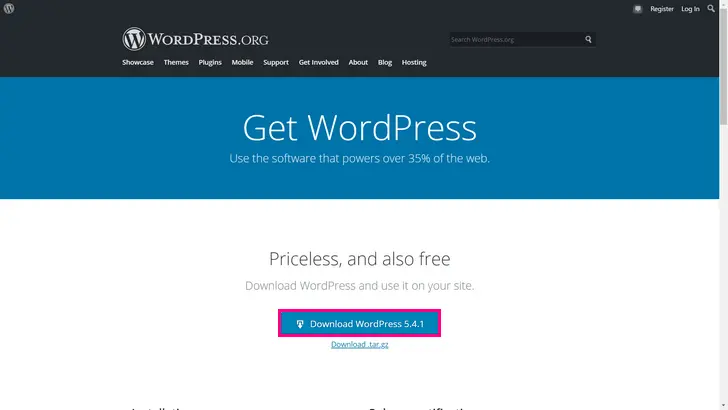
Nevertheless, despite the software being completely free, there are still certain essential costs you should be aware of, namely web hosting and domain name registration.
- Web hosting: The cost of web hosting varies depending on your site's needs. For instance, shared hosting ($2 to $10 per month) is excellent for smaller blogs or websites with moderate traffic. If your site grows, VPS hostings (between $20 and $60 per month) will offer more control and resources. And for high-traffic sites, we highly recommend dedicated hosting (up to $100 per month or even more).
- Domain name: Another cost to factor in is your domain name, which typically ranges from $10 to $20 per year, depending on the domain type and the provider. Some hosting companies offer free domains for the first 12 months, but you'll still need to pay for their renewal in subsequent years.
Still need more information? Check out our in-depth WordPress pricing analysis to get a clear picture of exactly how much you should invest!
Jimdo pricing
Our team has testified to hundreds of website builders during the past few years, yet Jimdo is among the first to introduce separate pricing plans for standard websites and online eCommerce stores.
Specifically, for websites, Jimdo offers four pricing plans: Free, Start, Grow, and Unlimited:
Free | Start | Grow | Unlimited | |
Price | $0 | $11/month | $18/month | $45/month |
Website pages | 5 | 10 | 50 | Unlimited |
Forwarding mail addresses | 0 | 1 | 5 | 20 |
Google Ads | No | No | Yes | Yes |
Storage | 500 MB | 5 GB | 16 GB | Unlimited |
When it comes to eCommerce stores, Jimdo provides three subscription options: Basic, Business, and VIP:
Basic | Business | VIP | |
Price | $18/month | $22/month | $45/month |
Website pages | 10 | 50 | Unlimited |
Google Ads | No | Yes | Yes |
Product variants | No | Yes | Yes |
Design analysis | No | No | Yes |
Storage | 10 GB | 15 GB | Unlimited |
The Verdict
Jimdo, albeit not free, offers eight competitive pricing plans with very clearly outlined benefits to help you get started quickly. Meanwhile, WordPress is 100% free but requires you to manage extra expenses (domain and web hosting) yourself. Hence, it’s fair to call this one a draw.
Hosting (Jimdo wins)
Needless to say, one cannot build a website without considering hosting. We did touch on WordPress's average hosting costs earlier, but that only scratches the surface when comparing WordPress vs Jimdo in this area. Let's look deeper and see how both platforms really stack up!
WordPress hosting
Once the WordPress installation is completed, you must research hosting providers all by yourself to ensure they meet WordPress’s essential system requirements for optimal security, such as:
- PHP 7.4 or higher
- MySQL 8.0 (or MariaDB 10.5) or higher
- HTTPS support
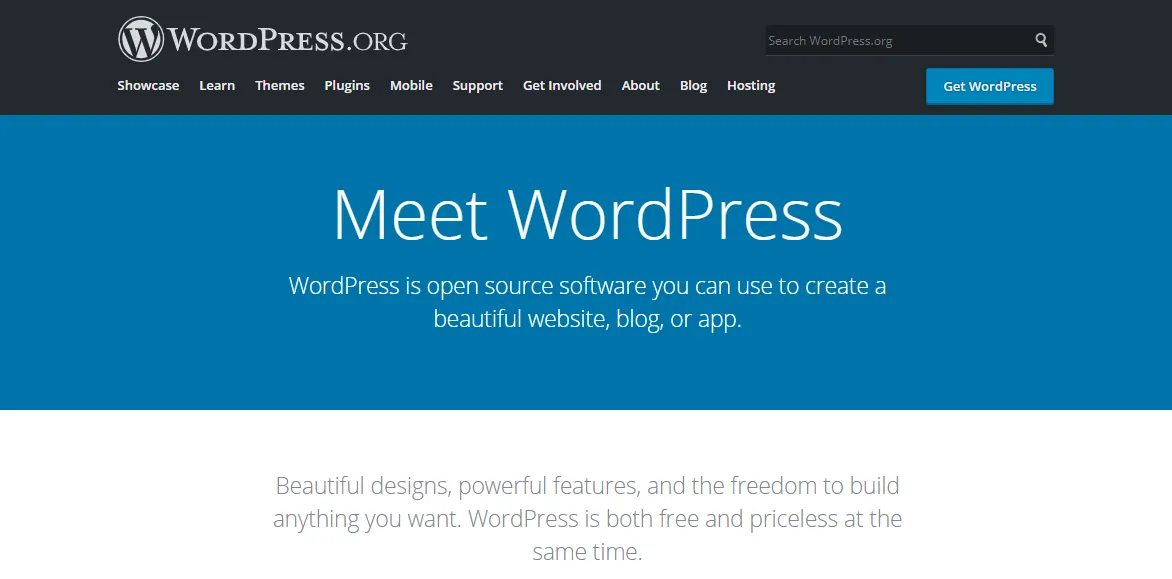
The task might seem simple, given that there are so many hosting options available. Nevertheless, the entire research and testing process can still feel overwhelming, especially for those just starting their website management journey.
Jimdo hosting

There's no need to hunt for a separate hosting provider; Jimdo has your back by including reliable hosting with ALL of its plans! Not to mention, every paid plan comes with free domains for the first contractual year to speed up your setup process even more.
To sum it up in simpler terms: once you sign up and register your domain, you can start customizing your site almost immediately without worrying about any hosting issues.
The Verdict
While selecting your own hosting provider does come with its advantages, it can be a hassle for beginners or anyone looking to save time. That's why, in this WordPress vs Jimdo comparison, Jimdo takes the crown for its simplicity and convenience.
Ease of use (A tie)
Nobody wants to waste hours wrestling with basic features, whether running a website or an eCommerce store. With that in mind, we decided to analyze how beginner-friendly these two platforms are.
WordPress ease of use
All in all, the intuitive block editor makes it quite a breeze to customize your WordPress website. Simply click the “+” button at the top left, and you can easily add text, logos, titles, multimedia, or widgets to your liking. Feel free to arrange those elements exactly how you want with the drag-and-drop functionality!
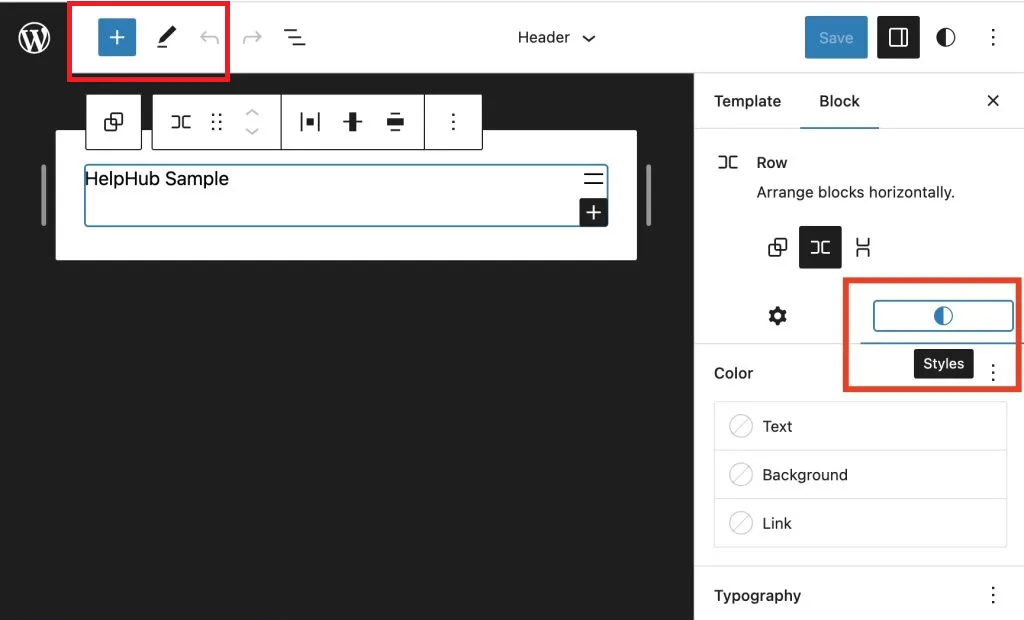
Still need more touch of creativity? The Block Patterns tab (with pre-designed patterns) can improve your site's layout in an instant. Custom CSS is also totally an option if you're confident with your coding skills.
Jimdo ease of use
Overall, setting up your Jimdo website is a breeze right from the start. When logging in, you'll have two buttons to choose from: “No coding required” or “For coding experts.”
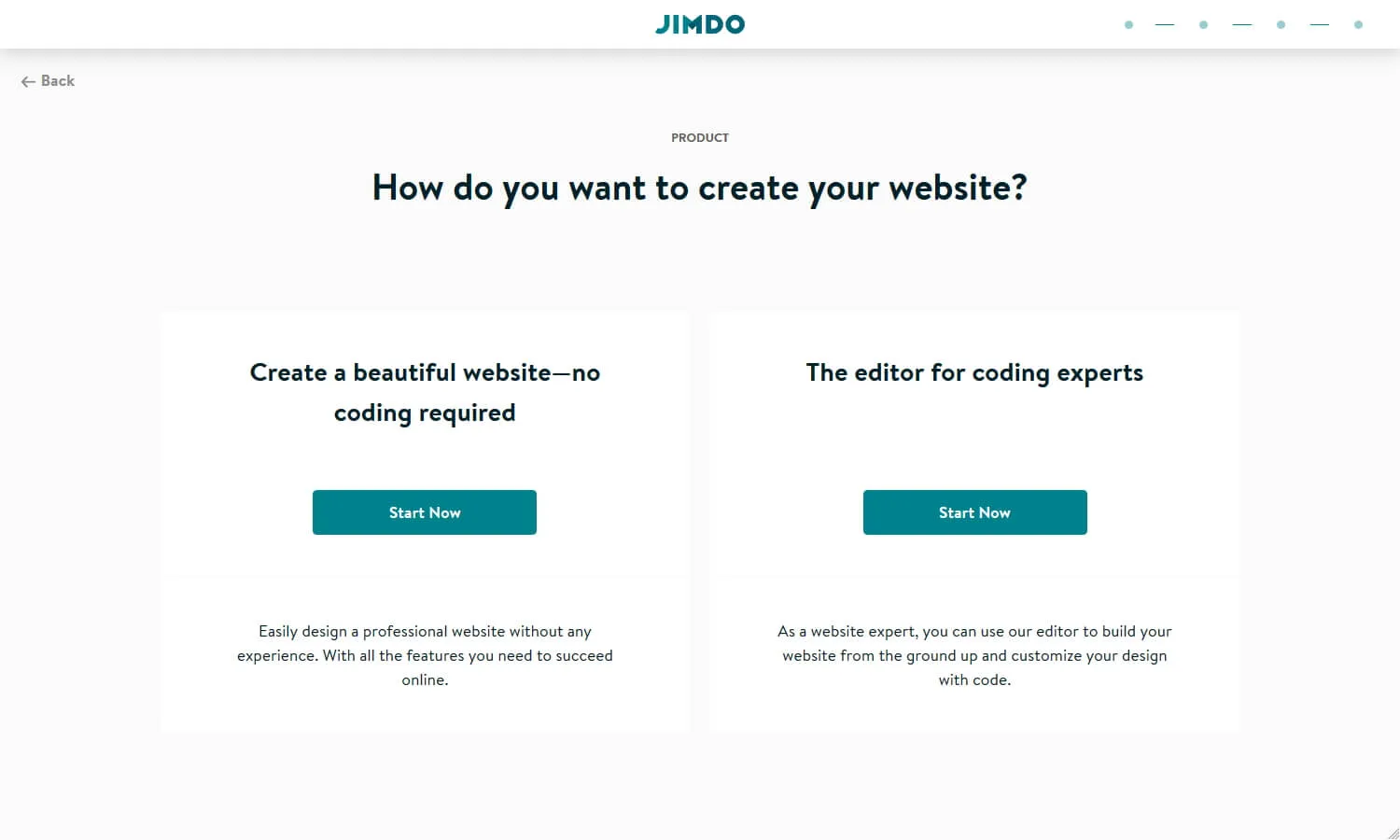
If you go with the no-code option, Jimdo’s built-in AI tools will guide you through an effortless setup! One of the main highlights is the Jimdo Logo Creator, which lets you design and download a simple logo for free — perfect for quickly establishing your brand even without design experience.
Regarding the “For coding experts” path, the name itself says it all. It opens up more customization options for advanced coders, allowing you to fully modify the code and make the website uniquely yours.
The Verdict
Despite their differences, both platforms are beginner-friendly and easy to navigate. So, overall, it's another draw between WordPress vs Jimdo.
Site templates (WordPress wins)
Aside from setting up the basic elements like menus, buttons, carts, sliders, etc., you should focus on your site's overall visual appeal as well. After all, it's often the first impression that decides whether customers stick around to explore more of your store!
Let's visit WordPress and Jimdo's template collections and see how they perform in that regard:
WordPress templates

As of this writing, WordPress offers an extensive library of over 12,000 free themes (the largest among CMSs), smartly organized into the following groups:
- Popular: Featuring the most in-demand themes
- Latest: Showing the newest additions to the collection
- Community: Displaying themes that are created and contributed by the WordPress community (meaning you can also contribute to developing/improving these themes if desired)
- Commercial: Comprising of quality themes designed for business/commercial sites
- Block themes: Providing a more flexible design experience using WordPress's new block editor.
And that's not all! To make your search even more precise, WordPress allows you to filter themes by features (e.g., threaded comments, translation ready), layouts (e.g., left/right sidebars), or topics (ranging from blog to eCommerce).
Ready to Migrate to WordPress?
If you want to migrate your store to WordPress, LitExtension offers an excellent migration service that helps you transfer all your data safely and accurately.
Jimdo templates

Currently, Jimdo offers around 21 themes, each with 5-6 variations (totaling over 100 options).
Since the collection is on the smaller side (meaning you can scroll through all the themes), there are no categories of filters available like with WordPress. Only after you've chosen a specific theme does Jimdo proceed to ask about your industry – whether health, books, food, beauty, or something else – to further personalize the website.
The Verdict
With over 12,000 themes and robust filtering options, WordPress is the solid winner in this round. Jimdo’s limited selection of just 21 themes (not including variations) feels quite underwhelming by comparison.
Apps and plugins (WordPress wins)
As a beginner, you can simply rely on the default themes and site builders to get your business up and running. But trust us; once your business expands, you'll likely want even more customization options! That's where apps and plugins come into play:
WordPress apps and plugins
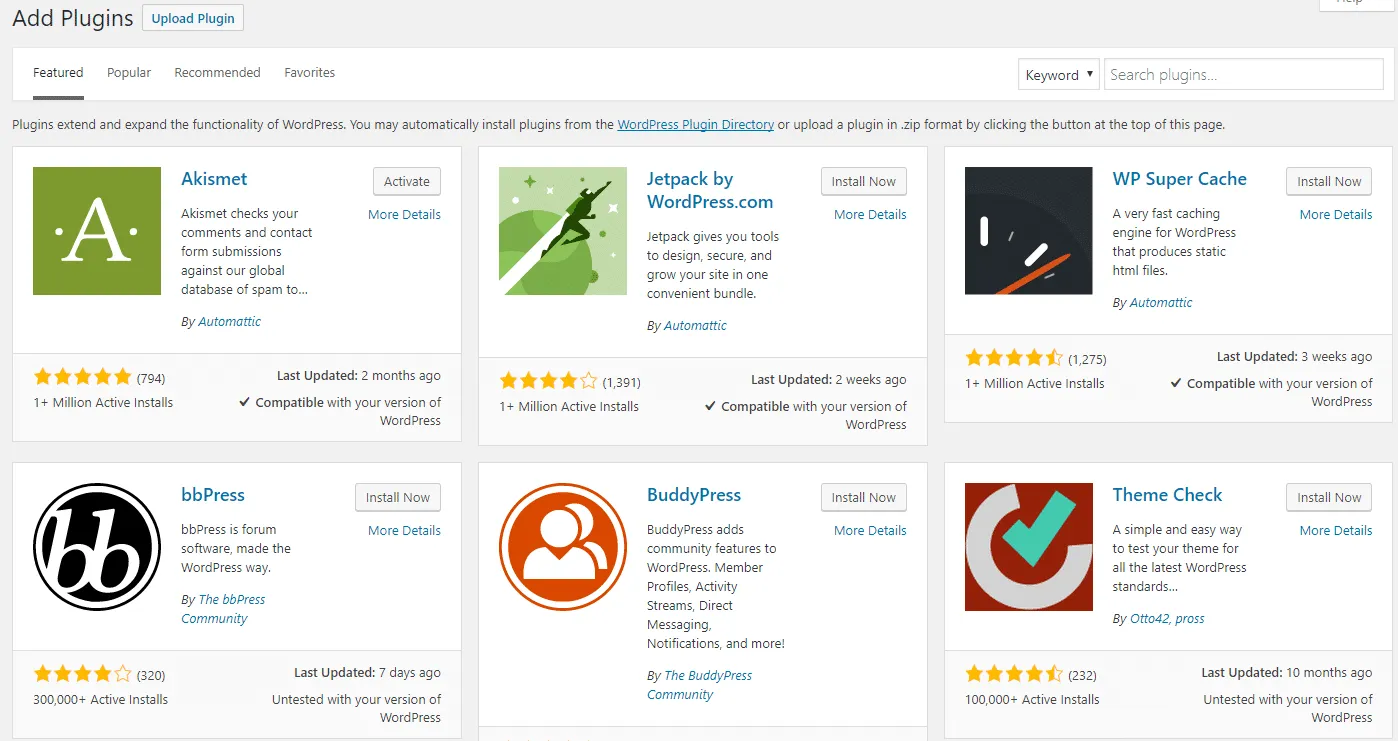
When it comes to plugins, WordPress truly shines with a massive library of over 59,000 options, which give you the power to customize your site in almost any way you can imagine!
What makes WordPress even more appealing is the wide range of plugin types to match different budgets:
- Free plugins: Developed by nonprofits or independent creators, they provide essential features at no cost.
- Premium plugins: For those who need regular updates and superior support, premium plugins (ranging from $2 to $1,000 per year) promise more dependable, feature-rich solutions.
- Freemium plugins: These bridge the gap between “Free and “Premium,” offering core functionalities for free with advanced options available through paid upgrades.
Jimdo apps and plugins
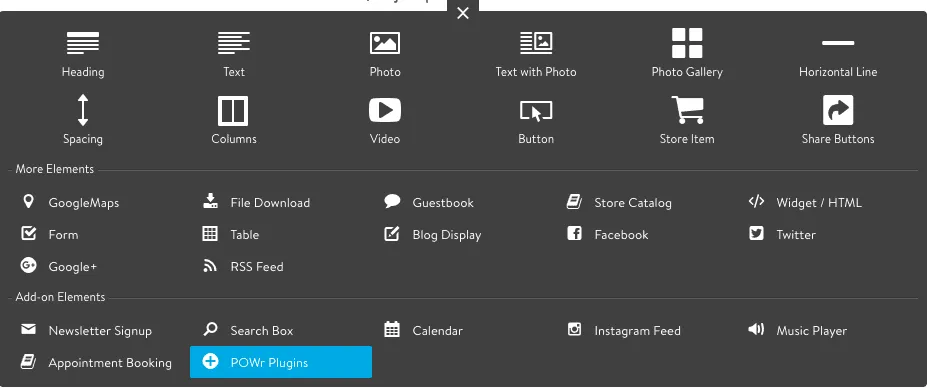
So far, Jimdo mainly integrates with four POWr plugins:
- POWr Contact Form Builder (for creating forms)
- POWr Hit Counter (tracking website traffic)
- POWr Popups, Sales & Email Pop (generating pop-ups)
- POWr Social Feed (showing your social media feed on your website)
Aside from these plugins, Jimdo only suggests five third-party tools (for adding booking or calendar buttons) and three text design tools. In essence, this rounds out the platform's quite modest app and plugin offerings.
The Verdict
WordPress takes a decisive lead here – not only over Jimdo but also nearly every other website builder and CMS in the market.
Loading speed (A tie)
No matter how well-customized your store may be (whether using built-in tools or third-party apps), it won't do if your visitors have to wait forever for it to load! Let's see how WordPress vs Jimdo stack up when it comes to performance and speed:

WordPress loading speed
Regarding loading speed, our tests during the past few months show that WordPress sites generally load in around 3 seconds – even with 20 to 30 plugins in play.
On another note, too many plugins (over 100) might burden your site and cause delays. Hence, if you notice your site slowing down, it might be time to declutter and remove some of those plugins.
Jimdo loading speed
According to our tester team, Jimdo's loading speed hits an impressive 2.1 seconds, which is more than efficient for most users' needs.
Some third-party tools claim to boost this speed by up to 5x, though we find those upgrades unnecessary given Jimdo's already strong performance. Plus, these tools aren't officially recommended by Jimdo or its partners, so if you still want to give them a try, proceed with caution and at your own risk.
The Verdict
Even when running numerous plugins simultaneously, WordPress can still maintain a quite fast load time (3 seconds). Meanwhile, Jimdo takes less to load than WordPress (2.1 seconds) but lacks an extensive plugin library to compare. Hence, we’re calling this round a draw.
eCommerce features (WordPress wins)
Since WordPress is quite popular among store owners and Jimdo even offers pricing plans for eCommerce, it's only natural to compare the two in this area. Let's see how WordPress vs Jimdo performs!
Inventory management
As of our writing, WordPress.org has not yet offered built-in inventory management tools. Instead, its users must rely on 9 third-party plugins for this task, each offering different features. (Don’t know which to choose? Check out our list of best WordPress eCommerce plugins!)
One standout plugin among them is WooCommerce, which transforms a standard WordPress site into a full-fledged eCommerce platform. It provides a robust set of inventory management tools as a result, enabling you to automate updates and easily manage bulk edits for prices, SKUs, locations, weights, and more.
And that's not all; WooCommerce also offers 46 extra extensions to further improve your experience. For a closer look, check out our detailed WooCommerce review here!
On the other hand, Jimdo relies solely on built-in tools to eliminate the need for third-party apps, allowing merchants like you to:
- Manage orders: You can easily track orders, marking them as “paid” (when the payment is received) and “sent” (after shipping). Once an order is both paid and shipped, it will automatically move to the Archive.
- Confirm shipping information: If desired, feel free to activate automatic confirmation emails to notify customers when their order is on the way.
- Adjust stock numbers: When restocking or managing external sales, you will find Jimdo's options for manual stock adjustments to be of great help here.
All in all, these Jimdo features are practical but quite basic, falling short when compared to WordPress’s extensive range of plugins and extensions. Hence, we can say WordPress is clearly the better choice for users seeking more robust functionality for product management.
Payment
So far, WordPress stands out with an impressive selection of over 659 payment plugins, which cover all major payment gateways like credit cards, PayPal, and even cryptocurrencies!
Among these plugins and extensions, WooCommerce Payments is definitely a solid choice, as you can:
- Handle both online and in-person payments
- Track revenue, oversee payment activity, and more straight from the store dashboard
- Automate recurring payments for billing, memberships, and subscriptions (though this feature is only available in the U.S.)
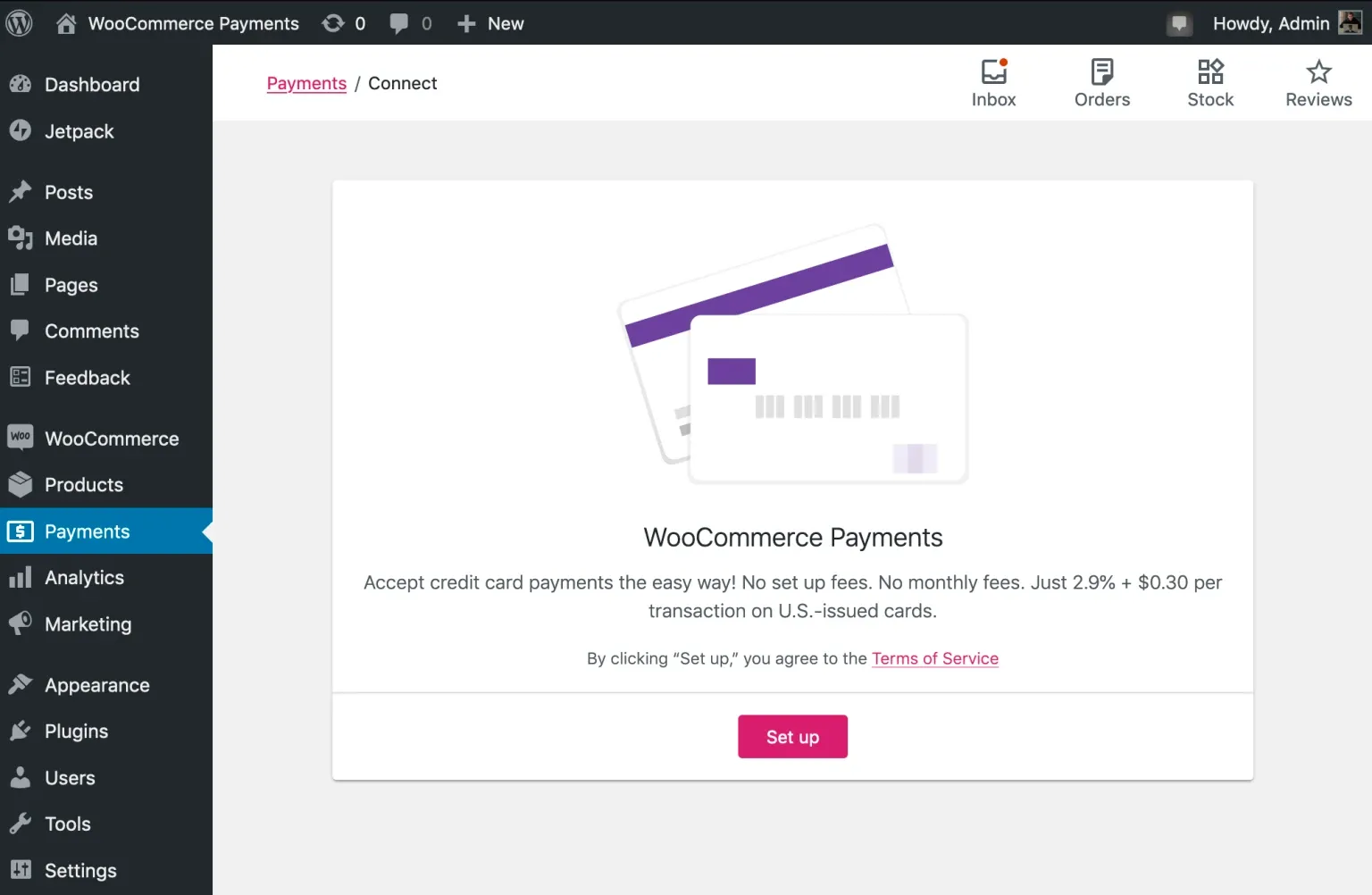
Even better, for businesses with an international reach, advanced plugins like FOX and YayCurrency will come in handy. They provide multi-currency switchers that allow your customers to shop freely and easily in their preferred currencies.
How about Jimdo? This platform offers some varieties of payment options based on the subscription plan you choose:
- Free plan: Test orders and PayPal
- Paid plans: PayPal, Stripe, Klarna Sofort, PostFinance (note that the latter two are only accessible in Germany, Switzerland, and Austria via Payment Options Plus)

As you can see, Jimdo’s overall selection of payment gateways is quite narrow compared to WordPress, meaning the latter totally takes the crown in this comparison.
POS
For POS (Point of Sales), WordPress offers about 20 plugins in total, all requiring WooCommerce installation beforehand.
Among these plugins, WooCommerce POS – Point of Sale is clearly the most popular, having earned 70 glowing reviews on WordPress.org and over 7,000 active installations. Some of its key features include:
- Cross-platform access: WooCommerce POS is available as both desktop and browser apps (support for iOS and Android is coming soon).
- Offline functionality: Even with an unreliable internet connection, you can still rely on fast product searches and smooth order processing, thanks to offline storage.
- Stock and pricing management: Just a few clicks, and you can easily manage product availability and pricing updates.
- Customer management: The Guest checkout option makes it a breeze to quickly add new customers or streamline sales.
- Miscellaneous product addition: Want to add products not already in your WooCommerce store directly into the cart? No problem; WooCommerce POS will help you handle that in just a few seconds.
Just this plugin alone already gives WordPress a clear edge over Jimdo, since the latter lacks POS support entirely and doesn’t have the option to connect to any POS devices.
The Verdict
WordPress easily takes the lead thanks to its massive plugin library. It's the apparent winner in this category — no contest!
SEO & Marketing features (WordPress wins)
Now that your site is set up, your theme is customized, and you've added your content, what's the next step? Obviously, it's time to boost the site's visibility! We've put WordPress vs Jimdo to the test to see how well they support marketing and SEO strategies:
WordPress SEO & Marketing features
The platform offers exceptional SEO-enhancing flexibility with nearly 1,000 plugins and extensions at your fingertips, many of which are completely free!
A standout crowd's favorite is Yoast SEO, renowned for comprehensive on-page recommendations for refining keyword usage and improving readability. Other powerful options include WP Meta SEO, SEOPress, Rank Math, and AIO SEO, which lets you monitor essential metrics while optimizing elements like meta descriptions, titles, and alt tags.
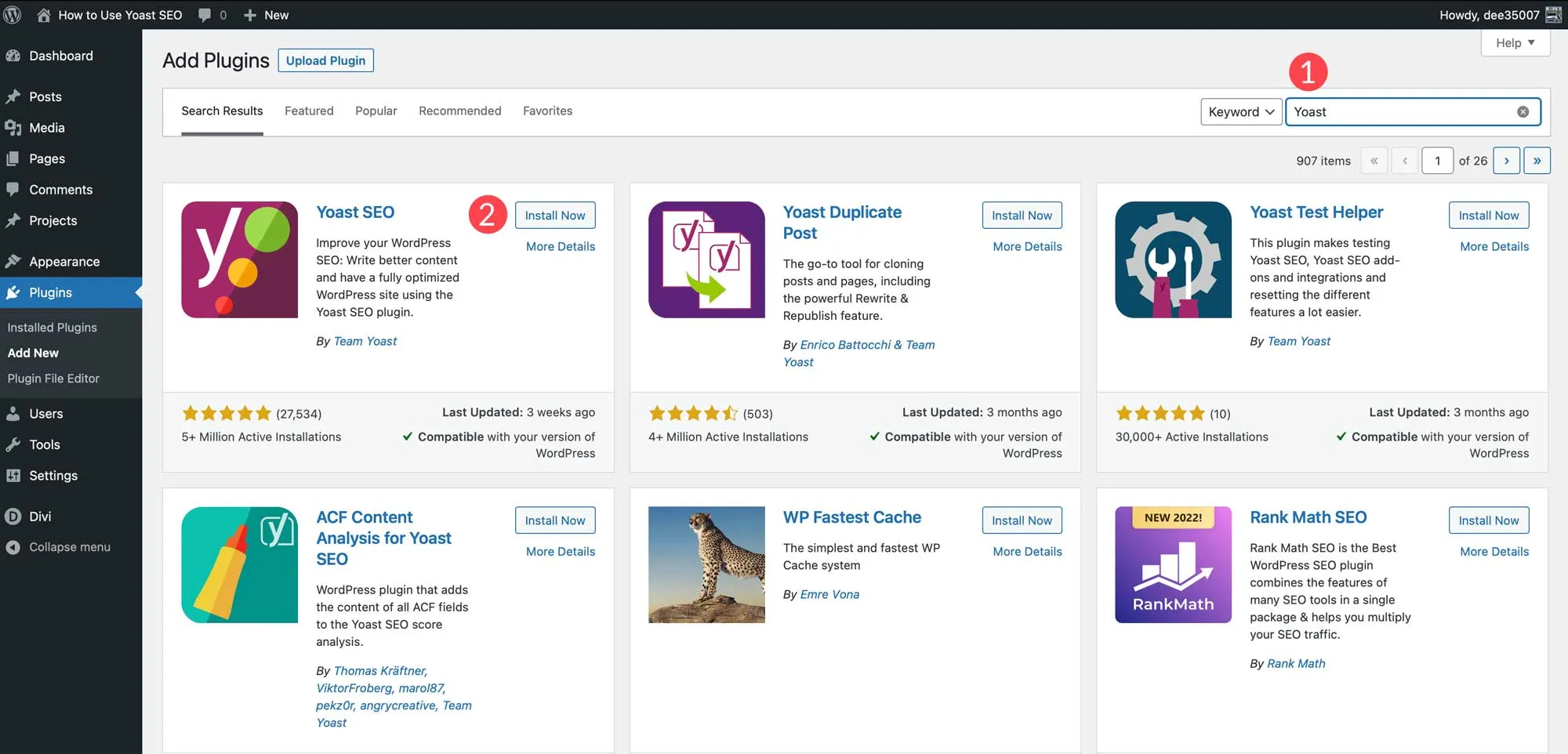
And when it comes to marketing, WordPress doesn't fall short either, offering around 340 plugins designed to boost promotion and customer engagement!
- If you want to create loyalty programs that reward repeat customers, plugins like Points and Rewards for WooCommerce are the best choice.
- For businesses that consider email campaigns the main focus, OptinMonster will work best. It provides a range of powerful tools like popups and floating bars to increase conversions and expand your email list.
Jimdo SEO & Marketing features
Unlike WordPress (which relies on plugins), Jimdo introduces a built-in SEO tool that automates essential tasks and provides transparent, step-by-step guidance on improving your site's visibility. You just need to follow the guidelines until all the boxes are checked!

On the marketing side, Jimdo includes a quite handy discount code feature. You can quickly create discount codes for your customers by filling in the code name, discount amount, minimum order value, and expiration date.
Unfortunately, aside from these two features, Jimdo falls quite short in the SEO/marketing aspect and still leaves plenty of room for further growth in the near future.
The Verdict
Jimdo's lack of robust SEO and marketing tools is a major setback, especially in today's highly competitive eCommerce landscape. That's why we decided to hand it to WordPress in this showdown.
Customer support (Jimdo wins)
Though we did agree early on that both platforms are user-friendly, that doesn't mean you can always navigate them without assistance. This brings us to a final, but equally crucial, factor in deciding whether WordPress vs Jimdo is the better fit for you: customer support!
WordPress customer support
As of our writing, WordPress.org doesn’t provide live chat or any other commonplace method to reach customer support.
Instead, users are directed to a well-stocked Help Center with hundreds of guides and detailed documentation covering a wide range of issues. The idea is for users to pinpoint their problem and find the relevant guide for a solution – all by themselves!

Thankfully, these guides are quite user-friendly, offering clear, step-by-step instructions with helpful visuals. As a result, troubleshooting the issue on your own might be much easier than you'd expect.
Aside from the self-help center, Woo Community is also an excellent resource to consider if you want to start selling on WordPress. Here, newcomers and seasoned sellers alike can find practical advice or clever workarounds from a passionate, active group of users, including sellers, developers, businessmen, WooCommerce enthusiasts, and more.
Jimdo customer support
Like WordPress, Jimdo's customer support is anchored by a robust knowledge base designed to help users tackle basic platform settings and common tasks on their own.

But what if your issue goes beyond what these self-help guides can handle? In that case, Jimdo offers several ways to reach their support team, including popular social media channels like Facebook, YouTube, Instagram, X (formerly Twitter), and Pinterest. You can also submit a help request via the Jimdo Help Support form.
Nevertheless, one huge downside is the total lack of phone or live chat support, which limits your access to immediate, real-time assistance.
The Verdict
Both platforms have their limitations when it comes to customer support, but Jimdo pulls ahead by offering more options beyond just a self-help center. For that reason, we consider it a clear winner over WordPress in this area.
Which One to Choose: WordPress vs Jimdo
While WordPress emerges as the overall winner, that doesn’t mean Jimdo falls short — quite the opposite! In fact, Jimdo holds its own by tying with WordPress in 3 out of 9 categories and even outperforming it in 2. Since both platforms offer quality experiences, let’s break down when each of them is the most optimal choice:
When to choose WordPress
Overall, WordPress is a great choice if you:
- Prioritize scalability: With over 59,000 plugins, WordPress provides an unmatched level of scalability, ideal for those who need robust functionalities for growing businesses, especially in eCommerce.
- Have technical knowledge (or are willing to learn): Though WordPress is user-friendly, it still requires research and management on your part, especially when choosing hosting providers or working with plugins. If that doesn't sound like a drawback to you, then you're all set!
- Need advanced SEO and marketing tools: Given its extensive SEO library (1000 options) and 340 marketing plugins, WordPress is clearly the top choice for businesses focused on online visibility.
When to choose Jimdo
Meanwhile, Jimdo will be the better choice than WordPress if you:
- Want a simple and quick setup: Since Jimdo offers built-in hosting and domain management, beginners or small businesses can get started immediately without worrying about technical aspects.
- Need little extensive customization: Given its modest collection of templates and plugins, Jimdo is better suited for users who are content with basic features and don't require heavy customization.
- Value customer support options: Jimdo edges out WordPress with more varied support channels, including social media platforms and direct help forms. Whether you're just starting to build your site or managing it post-launch, their team is always ready to assist whenever you need it.
WordPress vs Jimdo: FAQs
Which is better, Jimdo or WordPress?
WordPress outshines Jimdo with its vast collection of plugins and extensions, offering a level of customization far exceeding what Jimdo can provide.
What is the disadvantage of Jimdo?
Jimdo’s two major drawbacks are its limited app and plugin options, along with a fairly basic selection of SEO and marketing features.
Does anyone still use WordPress?
Absolutely! In fact, WordPress powers nearly one-third of all websites globally (65 million), as highlighted by Builtwith.
Final Words
It's quite evident that WordPress takes the lead in the WordPress vs Jimdo showdown. Given its impressive flexibility, WordPress’s always been considered the top choice for many merchants looking to start fresh or transition from another platform. If you want to migrate Jimdo to WordPress, you can refer to Jimdo to WordPress migration service in just 3 steps with LitExtension.
Nevertheless, we must say migrating to WordPress isn't always a walk in the park, especially if you're handling it solo or lacking technical support. That's where LitExtension steps in! With over 12 years of expertise, we've successfully migrated 300,000+ stores across 100 countries. Our dedicated support team will be with you every step of the way to ensure a smooth, confident launch for your new business.
For more insight, check out our eCommerce guides or join our Facebook Community.

